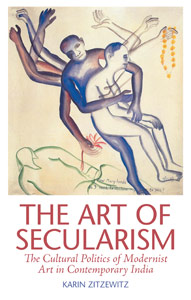The Art of Secularism
The Cultural Politics of Modernist Art in Contemporary India
A New Republic Book of the Year 2014
Description
Written in the wake of the widely publicised attacks by Hindu nationalist activists on the late M. F. Husain, India’s most famous artist and a prominent Muslim, The Art of Secularism addresses the entanglement of visual art with political secularism. The crisis in secularism in India, commonly associated with the rise of Hindu nationalism in the 1980s, transformed the meaning of art. It challenged the relationships between modernism, national culture, secularism and modernity that had been built since India’s independence in 1947.
The Art of Secularism describes how four renowned artists—M. F. Husain, K. G. Subramanyan, Gulammohammed Sheikh, and Bhupen Khakhar—developed their practice in an era when secular nationalism grappled with the recent re-enchantment of signs. Combining close readings of these artists’ work with ethnography of the art worlds of Mumbai and Vadodara, Karin Zitzewitz describes both the everyday forms of cosmopolitanism in the Indian art world and the increasing vulnerability of art world spaces to cultural regulation. She also presents the shifting conditions of the production and exhibition of art within the particularly urgent, varied, and sophisticated public debates about secularism in India, in which artists have been increasingly prominent interlocutors.
Reviews
‘The Art of Secularism probes the enormously complex dialectic between religious iconography and the secular image within the trajectories of modernism in India, and engages with some of its most volatile effects — censorship, blasphemy, intolerance, violence — in careful and intelligent ways. It opens up many powerful questions and lines of investigation, and will no doubt help galvanise future discussion in this under-explored scholarly terrain.’ — Saloni Mathur, Associate Professor, Department of Art History, UCLA
‘The Art of Secularism is an invaluable contribution to the scholarship on Indian art and visual culture: a timely, clear-headed, and sensitive investigation of Indian modernism at the flashpoint between the ‘normative secularity’ of art and politicised religiosity in the public sphere. Zitzewitz compellingly shows us how secularism is itself an art, a set of practices unfolding here as a richly textured range of responses to variously felt aesthetic and ethical imperatives to engage religious image-traditions. Her art historical account of artists and works is interwoven with a vivid ethnographic sense of the Indian art world and its performative contexts: not only its spaces of production, display and critique, from the studio, art school and gallery to the internet, law court, and cityscape, but also the deep ethical bonds of friendship at its heart. With remarkable economy, theoretical verve, solid groundwork and lovingly detailed observation she renders this complex terrain legible to those unfamiliar with it; for those inhabiting it her analysis will provide fresh resources to face the deepening threat to their freedom.’ — Kajri Jain, Associate Professor of Indian Visual Culture and Contemporary Art, University of Toronto
Author(s)
Karin Zitzewitz is Assistant Professor of Art History and Visual Culture at Michigan State University.
